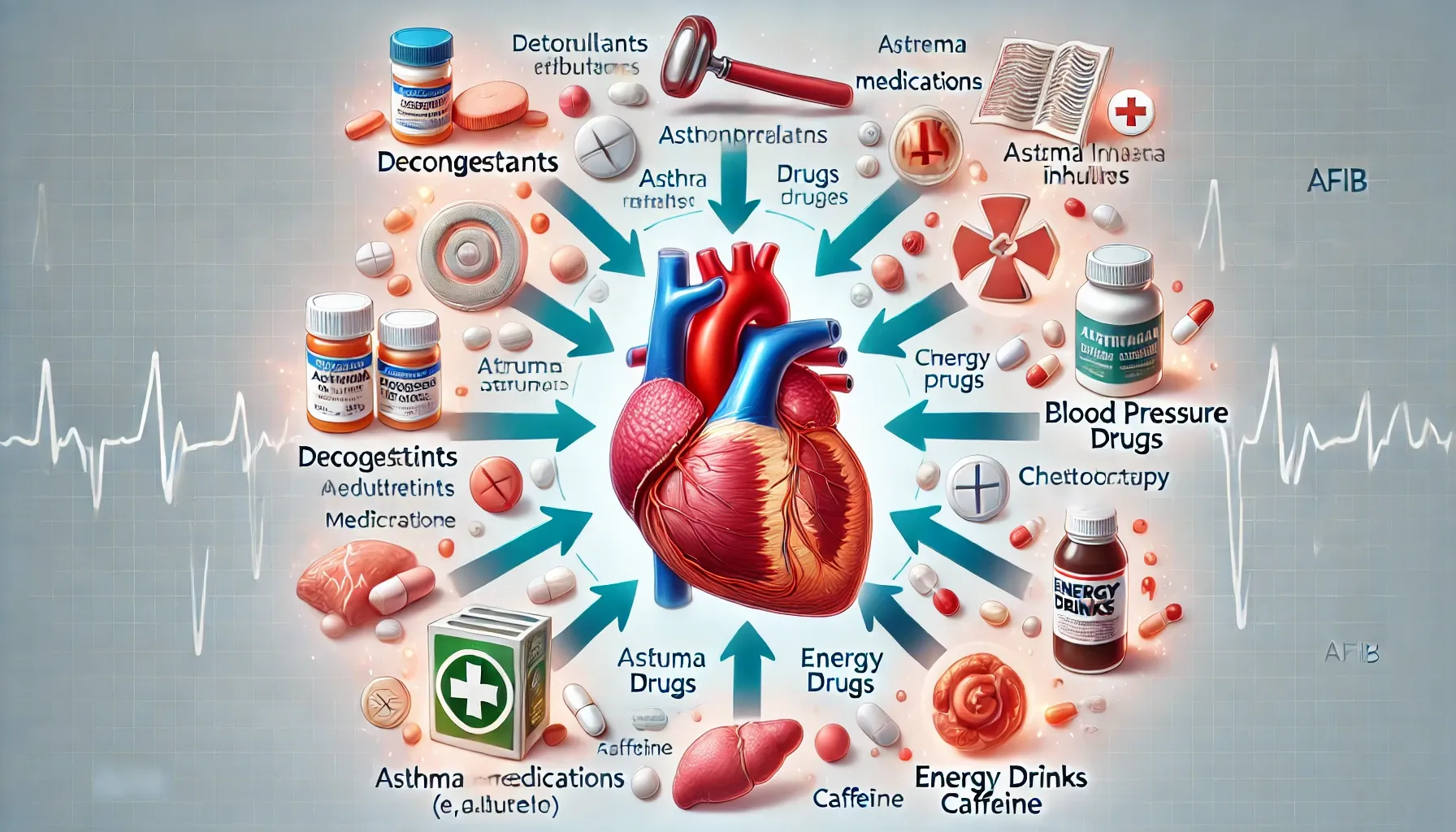Popular Medications Linked to Cause Atrial Fibrillation
Atrial fibrillation (AFib) is a common heart rhythm disorder that can cause stroke, heart failure, and blood clots. While lifestyle factors like stress and alcohol are known triggers, certain medications can also provoke AFib. This article highlights key medications linked to AFib, their effects on heart rhythm, and ways to stay informed.

1. Stimulants and Decongestants
Stimulants are among the most well-documented triggers of atrial fibrillation. These substances increase heart rate and stimulate the central nervous system, which can lead to irregular heart rhythms in susceptible individuals.
Common Examples:
- Pseudoephedrine: Found in over-the-counter (OTC) cold and allergy medications (like Sudafed), pseudoephedrine is a decongestant that constricts blood vessels, raising blood pressure and heart rate.
- Phenylephrine: Another decongestant often found in cold and flu medications, it has similar effects to pseudoephedrine.
- Caffeine: Although not a medication, high doses of caffeine found in energy drinks, supplements, and certain medications can stimulate the heart and trigger AFib episodes.
Why They Cause AFib:
Stimulants activate the sympathetic nervous system, which increases heart rate and raises blood pressure. In susceptible individuals, this heightened activity can lead to electrical disturbances in the heart’s atria, causing irregular rhythms.
What to Do:
If you’re prone to AFib, avoid OTC medications containing pseudoephedrine or phenylephrine. Look for "heart-safe" alternatives or consult your healthcare provider for recommendations.
2. Asthma and COPD Medications
Some medications used to manage asthma and chronic obstructive pulmonary disease (COPD) can inadvertently affect heart rhythms.
Common Examples:
- Albuterol (Proventil, Ventolin): A fast-acting bronchodilator used for asthma attacks.
- Levalbuterol (Xopenex): A similar bronchodilator used for respiratory distress.
- Theophylline: An older asthma medication that’s less commonly used today but still prescribed in certain cases.
Why They Cause AFib:
These medications act as beta-agonists, which relax airway muscles to ease breathing. However, they also stimulate heart receptors, causing an increase in heart rate and potentially triggering atrial fibrillation in sensitive individuals.
What to Do:
If you’re taking asthma or COPD medications and experience heart palpitations, inform your healthcare provider. They may adjust the dosage or switch you to an alternative treatment.
3. Heart and Blood Pressure Medications
Ironically, some medications used to treat heart conditions and control blood pressure may also cause atrial fibrillation in certain individuals.
Common Examples:
- Diuretics (like hydrochlorothiazide, furosemide): Used to reduce fluid buildup and lower blood pressure.
- Digitalis (Digoxin): Used to treat heart failure and certain arrhythmias but may trigger AFib if levels in the blood become too high.
Why They Cause AFib:
Diuretics: Excessive fluid loss can lead to imbalances in electrolytes like potassium and magnesium, both essential for maintaining a healthy heart rhythm. An imbalance increases the risk of AFib.
Digitalis: While useful for controlling heart rate, too much digoxin can cause electrical disturbances in the heart, triggering AFib.
What to Do:
If you’re on diuretics or digoxin, your doctor may recommend regular blood tests to monitor your potassium, magnesium, and drug levels. Be alert for symptoms like dizziness or palpitations and seek medical advice if they occur.
4. Chemotherapy Drugs
Certain chemotherapy agents used to treat cancer are known to have cardiotoxic effects, including the risk of developing atrial fibrillation.
Common Examples:
- Doxorubicin (Adriamycin): A chemotherapy drug used to treat breast cancer, lymphoma, and leukemia.
- Cyclophosphamide: Used to treat cancers like lymphoma and multiple myeloma.
- Taxanes (Paclitaxel, Docetaxel): Commonly used in breast and ovarian cancer treatments.
Why They Cause AFib:
Chemotherapy drugs can damage cardiac cells, cause inflammation, and create oxidative stress, all of which can alter the heart’s electrical activity. Patients undergoing chemotherapy are at higher risk for heart-related side effects, including AFib.
What to Do:
If you’re undergoing cancer treatment, cardiologists often work with oncologists to monitor heart health. Report any heart-related symptoms immediately, as early detection can prevent severe complications.
5. Antiarrhythmic Medications (Paradoxical Effect)
It may seem counterintuitive, but some antiarrhythmic medications meant to control irregular heart rhythms can, in certain cases, cause AFib.
Common Examples:
- Flecainide: Used to treat various arrhythmias, but in some cases, it may cause new arrhythmias.
- Propafenone: Prescribed to prevent AFib but may trigger it as a side effect.
Why They Cause AFib:
These medications work by altering electrical signals in the heart. If dosage is too high or if a person’s heart is especially sensitive, these changes can backfire, leading to new or worsened arrhythmias.
What to Do:
If you’re prescribed antiarrhythmics, follow your healthcare provider’s dosage instructions carefully. Notify them of any irregular heartbeats or symptoms.
6. Recreational Drugs and Supplements
Certain substances people consume recreationally or as supplements can trigger atrial fibrillation.
Common Examples:
- Alcohol: Excessive consumption (especially binge drinking) is a known trigger for AFib.
- Energy Drinks: High doses of caffeine and taurine can over-stimulate the heart.
- Dietary Supplements: Weight-loss supplements containing high doses of caffeine or other stimulants.
Why They Cause AFib:
These substances stimulate the nervous system, increase heart rate, and can cause the heart to beat erratically. Binge drinking, also known as "holiday heart syndrome," is a common cause of temporary AFib.
What to Do:
Limit alcohol and avoid energy drinks and unregulated supplements. If you’re prone to AFib, talk to your healthcare provider before taking any supplements.


